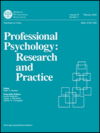MThe COVID-19 pandemic created an emergent need for teleservices in psychology, and with that novel challenges to psychological testing. These challenges can be navigated with adherence to best practices and guidelines. This is the bottom line of a recently published article in Professional Psychology: Research and Practice. Below is a summary of the research and findings as well as a translation of this research into practice.

Featured Article | Professional Psychology: Research and Practice | 2020, Vol. 51, No. 3, 199-204
Practical Guidance on the Use of the MMPI Instruments in Remote Psychological Testing
Authors
David M. Corey, Corey & Stewart, Portland, OR.
Yossef S. Ben-Porath, Kent State University
Abstract
The coronavirus-2019 pandemic was declared a national emergency in the United States on March 13, 2020. The disruptions resulting from subsequent unprecedented mitigation efforts have limited and, in some cases, eliminated the ability of psychologists to meet in person with their patients, clients, and examinees. This has led to a broad and sudden reliance on synchronous (live) videoconferencing (also commonly referred to as telehealth, telepsychological practice, and telepractice) to deliver clinical services. A vital component of psychological practice involves the administration of psychological testing, particularly in clinical settings and specialties that rely heavily on the use of assessment instruments. Remote administration of psychological testing presents challenges that cannot be ignored, even in a crisis, without risking the violation of ethical standards and without compromising the reliability and interpretability of test results and the security of test instruments. With these considerations in mind, we provide practical guidance for remote test administration, using the Minnesota Multiphasic Personality Inventory instruments.
Keywords
MMPI, telehealth, telepractice, telepsychology, remote testing
Summary of the Research
“In response to public health warnings about the high virulence and transmissibility of the SARS-CoV-2 virus and the potential for catastrophic loss of life, more than nine in 10 American residents are under government instructions to stay home as of this writing. The sweeping disruption in human travel, economic activity, and health care resulting from these mitigation efforts and from the surging infection rates that threaten to overwhelm the U.S. health care system has been staggering. This disruption extends also to psychologists’ and other health service providers’ ability to meet in person with their patients, clients, and examinees and has resulted in a broad and sudden reliance on synchronous (live) videoconferencing (also commonly referred to as telehealth, telepsychological practice, and telepractice) to deliver clinical services. For practitioners who have little or no previous experience with delivering psychological services via telehealth, this could mean running afoul of federal and state laws for protecting the security of electronically transmitted personal health information.” (p.199)
“…in recognition that health care professionals who would ordinarily be subject to the HIPAA Security Rule may, during this national emergency, provide telehealth services through remote communications technologies that “may not fully comply with the requirements of the HIPAA Rule,” the OCR issued a Notification of Enforcement Discretion for Telehealth Remote Communications During the COVID-19 Nationwide Public Health Emergency (Notification; OCR, 2020) that effectively waives penalties for noncompliance with the HIPAA Security Rule “in connection with the good-faith provision of telehealth using such nonpublic facing1 audio or video communication products during the COVID-19 nationwide public health emergency.” The OCR noted that “[t]his exercise of discretion applies to telehealth provided for any reason, regardless of whether the telehealth service is related to the diagnosis and treatment of health conditions related to COVID-19.” (p.200)
“There is ample evidence that the reliability and validity of MMPI test scores are preserved when the test is administered by computer or tablet…. that the conditions of administration indicated in the test manual are preserved, is the key challenge associated with remote MMPI administration.” (p.200)
Translating Research into Practice
“We illustrate this point and provide practical guidance for the remote administration of the Minnesota Multiphasic Personality Inventory (MMPI) instruments, both because they are the assessment instruments with which we have the greatest experience and because remote administration of the MMPI instruments was not available prior to the COVID-19 crisis. Although the principles underlying our advice are generalizable to other assessment instruments with remote administration capability, readers are advised to consult the test publisher for specific direction on how to achieve similar protections.” (p.200)
Select a Teleconference Platform That Conforms as Close as Possible to Health Insurance Portability and Accountability Act (HIPAA) Security Rule. (2013) Requirements
“the APA recommends that practitioners use a telehealth platform vendor that will sign a [business associate agreement] and that claims to be HIPAA compliant.” The practice advice cites five reasons for this recommendation: (a) “The notice still recommends doing so to better protect patient privacy. It also lists such vendors”; (b) “using a HIPAA-compliant vendor now will save practitioners from having to switch vendors and learn a new system once the crisis is over” (indeed, it is likely that many practitioners will continue to integrate telehealth into their practices even after the national health emergency ends); (c) “[t]he HHS Office of (sic) Civil Rights does not have authority to waive any similar requirements in state law”; (d) “the notice doesn’t suspend enforcement regarding your overall practice and HIPAA compliance”; and (e) “psychologists should not count on nonenforcement of any HIPAA requirement not directly related to providing telehealth.” (p.201)
“In addition to strong encryption capability, other features that enhance security and reduce the likelihood of hackers or uninvited participants from gaining access to the telehealth session include (a) requiring participants to use a unique password to participate in the session; (b) the ability to lock the session once the examinee and the proctor have joined the session, thereby preventing others from entering; (c) the use of a waiting room in which participants initially enter after identifying themselves and allowing the proctor to deny access to uninvited persons; (d) the option to prohibit participants from renaming themselves; and (e) disabling the share screen feature.” (p.201)
Ensure That the Proctor Is Able to Observe the Test Taker Before Providing Access to the Test
“It is important to never send the examinee the invitation until the test administrator or proctor is present (physically or via teleconference) and able to confirm:
a. the examinee’s identity,
b. the examinee completes the inventory on his or her own,
c. any unusual events that may occur during testing are noted so that they can be considered in the interpretation of the test results,
d. the testing environment is (and remains) conducive to obtaining optimally valid information, and
e. test security is maintained” (p.202)
“In practical terms, this means either sending the invitation to someone other than the examinee (i.e., the person who will be proctoring the remote testing session) or sending it to the test taker only after establishing the telehealth connection. Confirmation that the testing environment is private, conducive to testing, unaided by a third party, and secure may also be facilitated by an environment check at the start of the test session, in which the proctor asks the examinee to temporarily reposition the webcam to display the surrounding area.” (p.203)
Document the Use of Remote Test Administration and Telehealth Proctoring Both in Your Informed Consent Procedures and in Any Written Report, and Obtain All Necessary Consent for Remote Test Administration and Proctoring
“In addition to the obligation all psychologists have for obtaining and documenting informed consent when providing professional services (APA, 2017; Standard 3.10), state law may also impose specific requirements when engaged in telehealth.” p.203
“Psychologists should always consider whether remote test administration is viable or advisable for a particular examinee or situation, irrespective of informed consent. Individuals with significant cognitive impairments, with severe mental illness, or who are at risk for suicide, may not be suitable for remote test administration. In addition, some forensic or other evaluations conducted in an adversarial environment may be ill suited for remote test administration.” p.203
Consider Using a Checklist to Ensure That Issues Unique to Remote Test Administration Are Addressed
“…checklists…ensure that important actions are taken, and…pause points at strategic moments in a sequence of actions to confirm that the important actions have been taken.” p.203
Other Interesting Tidbits for Researchers and Clinicians
“Remote psychological testing involves Internet-delivered administration of a psychological test at a remote location rather than in person and administered by a practitioner or a trained assistant. The Joint Task Force for the Development of Telepsychology Guidelines for Psychologists (Joint Task Force) published general guidance on telepsychological practice, Guidelines for the Practice of Telepsychology” (p.200)
Join the Discussion
As always, please join the discussion below if you have thoughts or comments to add!






















